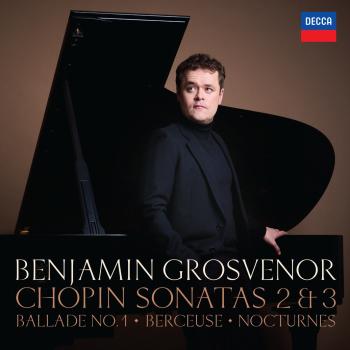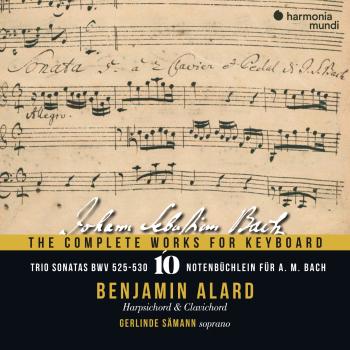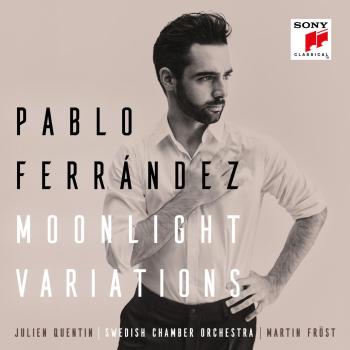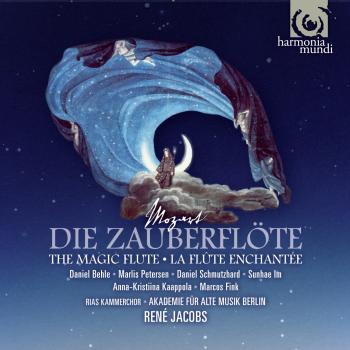
Witold Lutosławski - Opera omnia vol. 8 NFM Wrocław Philharmonic, NFM Choir & Antoni Wit
Album Info
Album Veröffentlichung:
2021
HRA-Veröffentlichung:
14.01.2022
Label: CD Accord
Genre: Classical
Subgenre: Choral
Interpret: NFM Wrocław Philharmonic, NFM Choir & Antoni Wit
Komponist: Witold Lutosławski (1913-1994)
Das Album enthält Albumcover Booklet (PDF)
- Witold Lutosławski (1913 - 1994): Twenty Polish Christmas Carols:
- 1 Lutosławski: Twenty Polish Christmas Carols: Angels to the shepherds came 02:25
- 2 Lutosławski: Twenty Polish Christmas Carols: Hey! We rejoice now 00:52
- 3 Lutosławski: Twenty Polish Christmas Carols: When the Christ to us Is born 01:55
- 4 Lutosławski: Twenty Polish Christmas Carols: Just after midnight 01:41
- 5 Lutosławski: Twenty Polish Christmas Carols: God Is born 02:24
- 6 Lutosławski: Twenty Polish Christmas Carols: Our lovely Lady 03:33
- 7 Lutosławski: Twenty Polish Christmas Carols: Hurrying to Bethlehem 00:58
- 8 Lutosławski: Twenty Polish Christmas Carols: In a manger 02:11
- 9 Lutosławski: Twenty Polish Christmas Carols: Jesus there Is lying 01:32
- 10 Lutosławski: Twenty Polish Christmas Carols: We Are shepherds 01:59
- 11 Lutosławski: Twenty Polish Christmas Carols: Lullaby, Jesus 02:01
- 12 Lutosławski: Twenty Polish Christmas Carols: Hey, on This day 01:22
- 13 Lutosławski: Twenty Polish Christmas Carols: Jesus, lovely flower 03:55
- 14 Lutosławski: Twenty Polish Christmas Carols: Hey la, hey la, shepherds there you Are 02:31
- 15 Lutosławski: Twenty Polish Christmas Carols: What to do with This child? 01:39
- 16 Lutosławski: Twenty Polish Christmas Carols: Hey, hey, lovely Lady Mary 02:25
- 17 Lutosławski: Twenty Polish Christmas Carols: This Is our Lord’s birthday 02:09
- 18 Lutosławski: Twenty Polish Christmas Carols: Shepherds, can you tell? 01:52
- 19 Lutosławski: Twenty Polish Christmas Carols: Infant, so tiny 02:18
- 20 Lutosławski: Twenty Polish Christmas Carols: Holy Lady Mary (Wandered through the world wide) 02:18
Info zu Witold Lutosławski - Opera omnia vol. 8
Lutosławski’s twenty carols are not a ‘Top Twenty’ collection; conspicuous by their absence are some of the most popular carols like Wśród nocnej ciszy (In the midst of night’s quiet), Mędrcy świata (Wise men of the world) or Pójdźmy wszyscy do stajenki (Let’s all go to the stable) while little known works are included. (…)
Nevertheless our compilation effectively represents the genre’s main varieties. Here we have two basic models: the lullaby and pastorale (sometimes considered a separate genre – like in Mioduszewski’s works). The borderlines between the carol and the pastorale are fluent; the presence of a pastoral topos itself, notated in the gospels, does not predetermine its affiliation. However, in my opinion, one is able to discover a generic determinant: possibly by individualizing the shepherds, including giving them names, giving a greater role to details of everyday life and including an element of dialogue; a pastorale can be – like in other countries – a para-theatrical genre, whose sources are often deeply-rooted: in Poland we also come across direct references to ancient Arcadian settings, together with Greek names. (…)
The lullabies are rather more homely with Slavic lyricism undoubtedly at their core. Gdy śliczna Panna (Our lovely Lady), Jezus malusieńki (Jesus there is lying), Dziecina mała (Infant, so tiny) and of course the extremely popular Lulajże, Jezuniu (Lullaby, Jesus; paraphrased by Chopin) are clearly stamped with ethnicity, both in terms of text and music.
Some melodies however do not fit in with this dichotomy. Such is the first chorale Anioł pasterzom mówił (Angel to the shepherds came); the same can be said of the solemn Gdy się Chrystus rodzi (When the Christ to us is born) scripted by a rather more academic hand, as well as the aristocratic Bóg się rodzi (God is born) – the only carol whose text was penned by the prominent poet, Franciszek Karpiński (1741–1825), a leading figure of Polish Enlightenment and Pre-Romanticism. His exquisite poem based on a series of oxymorons has almost become a national hymn, whose singing at the conclusion of services during the Christmas period has become a tradition. The work’s composer has never been identified – some see it as an arrangement, nevertheless in its entirety the piece suggests a professional technique.
Aleksandra Kurzak, soprano
NFM choir
Agnieszka Franków-Żelazny, artistic director of NFM choir
NFM Wrocław Philharmonic
Antoni Wit, conductor
Aleksandra Kurzak
Polish-born soprano Aleksandra Kurzak began her musical education at the age of 7, playing violin and piano. She studied voice at the conservatories of Wroclaw and Hamburg. She made her professional opera debut at the age of 21 at the Wroclaw State Opera as Susanna in Le Nozze di Figaro. Her mother and teacher Jolanta Żmurko performed the role of Countess. Kurzak is a laureate of singing competitions in Warsaw, Barcelona, Helsinki and Canton. In 2009 she received a PhD in Music.
Between 2001 and 2007 Kurzak was a member of the ensemble of the Hamburg State Opera, where she sang numerous roles: Queen of the Night, Blonde, Susanna, Servilia, Marzelline (Fidelio), Nanetta (Falstaff), Ännchen (Der Freischütz), Gilda, Adèle, Gretel (Hänsel und Gretel), Maid (Powder her Face), Musetta, Cleopatra, Fiorilla (Il Turco in Italia), Marie (La Fille du Régiment)
In 2004 Kurzak made her debut at The Metropolitan Opera in the role of Olympia in Les Contes d’Hoffmann. In the same season she debuted at the Royal Opera House-Covent Garden as Aspasia in Mitridate, Re di Ponto. The artist returned to the Met, singing Blonde in Entführung aus dem Serail, Gilda in Rigoletto, Gretel in Hansel & Gretel and Adina in L'Elisir d'amore. Since her first London appearance, Kurzak has returned regularly to the Royal Opera House, where she has performed roles of Norina (Don Pasquale), Adina (L’elisir d’amore), Susanna, Matilde (Matilde di Shabran), achieving a real triumph on this stage and most recently as Fiorilla (Turco in Italia), Rosina (Il Barbiere di Siviglia), Gilda and the title role in Lucia di Lammermoor.
In February 2010 Kurzak made her debut at the Teatro alla Scala in the role of Gilda and returned as Susanna and Adele in Le Comte Ory.
Kurzak has appeared as well at the Staatsoper in Berlin (Queen of the Night), Teatro Regio in Parma and Théâtre du Capitole in Toulouse (Gilda), Bavarian State Opera in Munich (Cleopatra, Adele, Rosina, Fiorilla, Adina, Rachel), Vienna State Opera (Rosina, Adina, Susanna, Marie, Gilda, Violetta), Teatro Regio in Torino (Vioetta), Teatro Massimo in Palermo (Norina), Teatro Massimo di Bellini in Catania (concert with arias by Bellini), Teatro Real in Madrid (Susanna, Marie), Lyric Opera House in Chicago (Blonde), Salzburg Festival (concert arias by Mozart, Ännchen and Donna Anna), Arena di Verona (Rosina, Juliette, Gilda, Verdi-Gala), Los Angeles Opera (Fiordiligi), San Francisco Opera (Gilda), Palau de les Arts in Valencia (Adina), Mozart Festival in A Coruña as well as at the Welsh National Opera in Cardiff (Aspasia) and at the Theater an der Wien (Donna Anna and Amenaide), Finnish National Opera (Gilda), National Opera in Warsaw (Gilda, Violetta, Lucia) and Teatro La Fenice (Donna Anna), Opernhaus in Zurich (Gilda, Norina, Nedda), Opera de Paris (Adina) and Lucia in Seattle.
Kurzak has collaborated with many well known conductors including Ivor Bolton, Bruno Campanella, James Conlon, Sir Andrew Davis, Christoph von Dohnanyi, Riccardo Frizza, Rafael Frühbeck de Burgos, René Jacobs, Fabio Luisi, Nicola Luisotti, Sir Charles Mackerras, Ingo Metzmacher, Daniel Oren, Antonio Pappano, Carlo Rizzi, Ralf Weikert, and Simone Young.
Aleksandra Kurzak has an exclusive recording contract with DECCA.
In the season 2016/2017 Kurzak will appear Mimi at the Staatsoper in Berlin, Micaela in Opera de Paris, Adina at the Deutsche Oper Berlin, as well as Adina and Liu at the ROH.
Antoni Wit
one of the highly regarded Polish conductors, studied conducting with Henryk Czyż and composition with Krzysztof Penderecki at the Academy of Music in Cracow. He subsequently continued his studies with Nadia Boulanger in Paris. He also graduated in law from the Jagiellonian University in Cracow. Immediately after graduation he was engaged as an assistant at the Warsaw Philharmonic Orchestra. Later he became the conductor of the Poznań Philharmonic, worked with the Warsaw Grand Theatre and was artistic director of the Pomeranian Philharmonic (1974-77) and next director of the Polish Radio and Television Orchestra and Chorus in Cracow.
For 17 years, starting in 1983, Antoni Wit was the director of the National Polish Radio Symphony Orchestra in Katowice. He is the longest-standing director in the history of this orchestra. In 1987-1994 he was the first guest conductor of Orquesta Filarmónica de Gran Canaria. In January 2002 he was appointed general director and artistic director of the Warsaw Philharmonic.
He has conducted in nearly all the most important European music centres, in both Americas, in the Middle East and the Far East. He has recorded over 90 albums for such labels as EMI-HMV, CBS, Camerata Tokyo, NVC Arts, Pony Canyon, Naxos, Polskie Nagrania. In 1985 his recording for EMI of Stabat Mater by Szymanowski was considered by the English critics as one of the best records of the year. In 1993 the CDs containing Prokofiev’s all piano concertos released by Naxos was awarded the Diapason d’Or and Grand Prix du Disque de la Nouvelle Académie du Disque. Lately the artist has completed the recording of all the great orchestral works of Witold Lutosławski to be released in a set of nine CD’s.
Antoni Wit won second prize at the Herbert von Karajan International Conducting Competition in Berlin, as well as many state awards. He received the critics’ Orfeo Prize twice (1984, 1996) for the best performance of Polish music during the Warsaw Autumn festivals.
In 1998 he received the Polish Radio “Diamond Baton” award for outstanding artistic creations popularizing Polish music at home and abroad. He was listed as number 55 in “The Silesian of the Century” ranking by Gazeta Wyborcza. He has conducted such orchestras as The London Philharmonic, BBC Symphony Orchestra, Philharmonia Orchestra in London, Berliner Philharmoniker, Orchestra dell’Accademia di Santa Cecilia in Roma, Tonhalle-Orchester Zürich, Dresdner Philharmonie.
He is regularly invited to participate in music festivals in Poland and abroad. In recent seasons he appeared with the National Polish Radio Symphonic Orchestra at La Roque d’Anthéron Piano Festival (France), Al Bustan Festival (Lebanon), Bad Hersfeld Festival (Germany), the Dresden Contemporary Music Days and the prestigious festivals at home (Warsaw Autumn, Wratislavia Cantans, Music in Old Cracow, Ludwig van Beethoven Easter Festival, Polish Radio Music Festival).
Last season Antoni Wit conducted such orchestras as the Bergen Philharmonic, Orchestre National de Belgique, Radio Symfonie Orkest in Hilversum, Opéra de Marseille, Orquesta Sinfónica del Principado del Asturias in Spain, Orquesta Filarmónica de Gran Canaria, Kansai Philharmonic in Osaca, Bamberger Symphoniker, National Symphony Orchestra w Dublinie, Budapest Festival Orchestra, Montreal Symphony, Orchestre Philharmonique du Luxembourg and MDR – Sinfonieorchester Leipzig.
On January 20 the artist received the coveted Cannes Classical Award for the recording of Turangalîla-Symphonie by Messiaen for Naxos in the category of the Great Musical Works of the 20th Century (Midem Classique 2002)
Antoni Wit is also a professor at the Academy of Music in Warsaw.
Booklet für Witold Lutosławski - Opera omnia vol. 8









